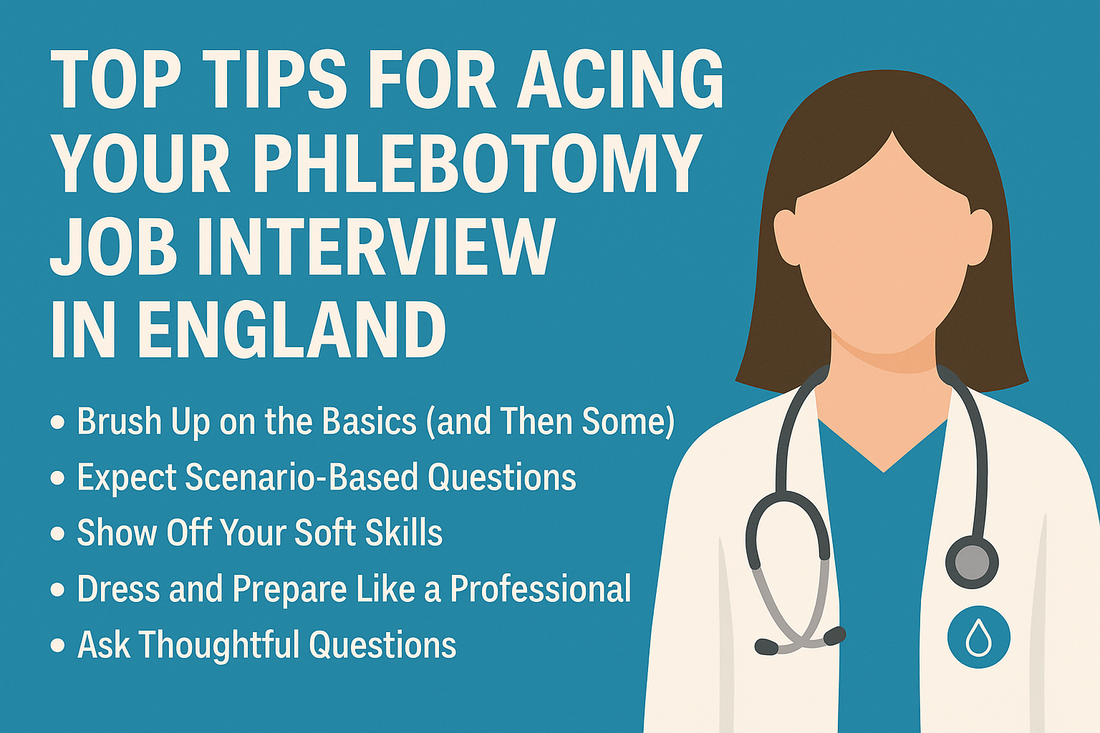If you’re preparing for your first phlebotomy job interview — or returning to the field after a break — it’s completely normal to feel nervous. But with the right preparation, you can walk into that interview confident, knowledgeable, and ready to impress. Whether you're applying to work in the NHS, private sector, or through an agency, this guide shares our top tips to help you stand out and secure the role.
1. Brush Up on the Basics (and Then Some)
Most interviews for phlebotomy roles will include questions to test your technical knowledge. You don’t need to recite medical textbooks — but you do need to show you understand safe and accurate phlebotomy practice. Make sure you’re confident with:
- The Order of Draw and why it matters.
- Types of blood collection tubes and their additives.
- Infection prevention and control protocols.
- Patient identification and consent procedures.
- What to do if a patient feels faint or is hard to bleed.
💡 Top Tip: If you trained with us, revisit your course notes or download our cheat sheets to refresh your knowledge. Alternatively, head directly to the website of the job you are applying for and check what procedures they have publicly available.
2. Expect Scenario-Based Questions
Interviewers love to present real-world scenarios to see how you'd respond. These questions test your ability to remain calm, professional, and patient-focused. Common examples include:
- “What would you do if a patient became unwell during a blood draw?”
- “How would you handle a needle-phobic or distressed patient?”
- “What steps do you take to prevent needlestick injuries?”
Use the STAR technique (Situation, Task, Action, Result) to structure your answers clearly and confidently.
3. Show Off Your Soft Skills
While technical knowledge is crucial, soft skills are what truly make a great phlebotomist. Interviewers will be looking for candidates who are:
- Empathetic – able to reassure anxious patients.
- Organised – keeping samples labelled and logged correctly.
- Professional – aware of confidentiality, boundaries, and workplace conduct.
- Adaptable – handling different patient types and working environments.
Don’t just say you’re “good with people” — give examples. Talk about a time you helped calm a nervous patient, worked well in a team, or dealt with a challenging situation.
4. Dress and Prepare Like a Professional
Even if the role is clinical, interviews often take place in office settings — especially within hospitals or private clinics. Dress smartly and be punctual. Bring with you:
- Your training certificates (especially competency-based ones).
- Photo ID (some interviews may require it).
- DBS certificate if you already have one.
- References or the contact details for them.
💡 Bonus tip: Print your CV and bring a copy with you — it shows you're prepared.
5. Ask Thoughtful Questions
At the end of the interview, you’ll usually be asked, “Do you have any questions for us?” This is your chance to show you’re genuinely interested in the role. Some great questions include:
- “What’s a typical day like for a phlebotomist here?”
- “What kind of support or ongoing training do you offer?”
- “How do you manage high patient volumes or difficult blood draws?”
Asking questions not only shows curiosity — it also helps you figure out whether the workplace is a good fit for you.
Final Thoughts
Interviewing for a phlebotomy role is your chance to show you’re not just trained — you’re ready. A strong mix of technical understanding, patient-focused communication, and a professional attitude will set you apart. At The Phlebotomy Centre, we don’t just train people to pass courses — we prepare them for the real world. If you’re still looking to boost your confidence or refresh your skills, explore our refresher training options or reach out to our team for advice.
Ready to land your first phlebotomy job? Or need to refresh your training before applying?
No phlebotomy background
I found theory very easy to understand. Practical was well explained and very hands on really enjoyed learning something new. Definitely will be back if need anything more.
Thank you The Phlebotomy Centre!
Check out more reviews here!

